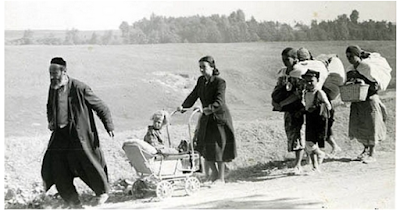
The news that the US is no longer funding UNWRA (the UN Works and Relief Agency) should remove one of the major obstacles to settling the conflict between Israel and the Arabs. UNWRA has been perpetuating the delusion that the Palestinians are in transit to their permanent home in Israel and that one day they will return. If the ‘refugees’ come under the umbrella of the UNHCR, the focus will be on rehabilitation and resettlement in their host countries.
Jewish refugees fleeing areas conquered by the Arab Legion in 1948. Some 3,000 Jews fled east Jerusalem.
It is not generally known that UNWRA was established with the aim of helping refugees on both sides of the conflict.
According to Don Peretz (Who is a Refugee?) initially UNRWA defined a refugee “as a needy person who, as a result of the war in Palestine, has lost his home and his means of livelihood.” This definition included some 17,000 Jews who had lived in areas of Palestine taken over by Arab forces during the 1948 war and about 50,000 Arabs living within Israel’s armistice frontiers. Israel took responsibility for these individuals, and by 1950 they were removed from the UNRWA rolls leaving only Palestine Arabs and a few hundred non-Arab Christian Palestinians outside Israel in UNRWA’s refugee category.
At the time there was no agreed definition of what constitutes a refugee. In 1951, The UN Refugee Convention agreed the following definition:
“A person who owing to a well-founded fear of being persecuted for reasons of race, religion, nationality, membership of a particular social group or political opinion is outside the country of his nationality and is unable or, owing to such fear, is unwilling to avail himself of the protection of that country; or who, not having a nationality and being outside the country of his former habitual residence as a result of such events, is unable or, owing to such fear, is unwilling to return to it.”
This definition certainly applies to the Jewish refugees fleeing persecution, synagogue burnings, arrest and riots. Returning to Arab countries would put their lives at risk.
The burden of rehabilitating and resettling the 650,000 Jewish refugees who arrived in Israel was shouldered by the Jewish Agency and US Jewish relief organisations, such as the Joint Distribution Committee.
In contrast to the $17.7 billion allocated to the Palestinian refugees, no international aid has been earmarked for Jewish refugees. The exception was a $30,000 grant in 1957 which the UN, fearing protests from its Muslim members, did not want publicised. The grant was eventually converted into a loan and paid back by the American Joint Distribution Committee, the main agency caring for Jews in distress.
Yet on two occasions the UN did determine that Jews fleeing Egypt and North Africa were bona fide refugees. In 1957, the UN High Commissioner for Refugees, August Lindt, declared that the Jews of Egypt who were ‘unable or unwilling to avail themselves of the protection of the government of their nationality’ fell within his remit. In July 1967, the UNHCR recognised Jews fleeing Libya as refugees under the UNHCR mandate.
For any peace process to be credible and enduring, the international community would be expected to address the rights of all Middle East refugees, including Jewish refugees displaced from Arab countries. Two victim populations arose out of the Arab-Israeli conflict, and the Arab leadership bears responsibility for needlessly causing both Nakbas – the Jewish and the Arab. As the human rights lawyer Irwin Cotler observes: ‘Put simply, if the Arab leadership had accepted the UN Partition Resolution of 1947, there would have been no refugees, Arab or Jewish.‘

Leave a Reply